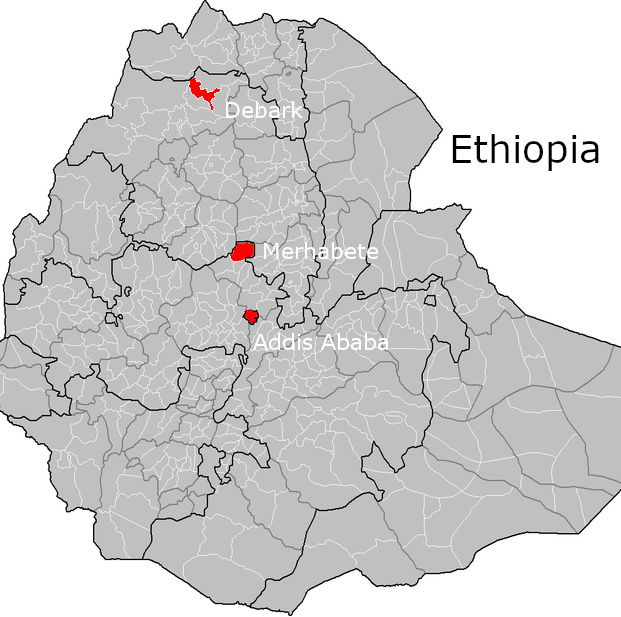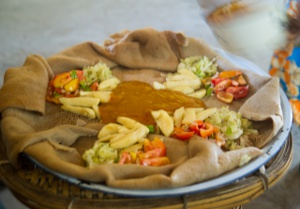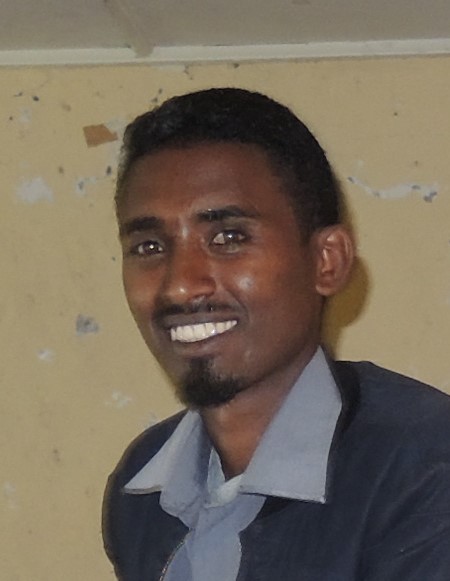Project In Ethiopia

Where we are active
Alem Ketema and Merhabete
The city of Alem Ketema, ca. 20.000 inhabitants, is the administrative center of the Woreda (district) Merhabiete, around 180 km north of the capital city Addis Ababa. It lies at the edge of a plateau around 2300m above sea-level. A, mostly unpaved, road connects Alem Ketema with the capital. The city has been connected to the Ethiopian power grid since 2013. Very few private households have electricity.
The connection to Alem Ketema came via Städtepartnerschaft Vaterstetten - Alem Ketema (Partner City Project between Vaterstetten and Alem Ketema). Representatives of the "Ofenmacher" visited Alem Ketema for the first time at the start of 2013.
Debark and Simien Mountains
The Simien Mountains National Park, which was established in 1969 and is a UNESCO World Heritage Site, extends to the east of the district capital Debark in the district of the same name. Since the beginning of this millennium, various projects have been running to preserve the park and improve infrastructure, tourism and the livelihood of the locals. In 2014 we were asked by the African Wildlife Foundation to expand their program to support villages around the park by building stoves.
Debark is at an altitude of around 2800m, the villages around the park up to around 3500m. The climate and living conditions are correspondingly harsh, especially for the rural population.
The Ethiopian Stove "Chigir Fechi"
The Stove
Injera, a flatbread made mostly from flour from the local wheat Teff, is an indispensible part of every meal in the northern half of Ethiopia. Injera is cooked on a round clay plate of around 65 cm diameter - the so-called Met'ad. Normally fresh injera is made two to three times a week. More than half of the wood required for cooking each week is used for making injera.

The clay stove used in Ethiopia therefore has, in addition to the fireplace for cooking, a second fireplace for the Met'ad, which from the perspective of the Ethiopian user is the main cooking area. The exhaust air from the Met'ad combustion chamber as well as the gas from the cooking pot heat another pot placed next to the chimney.
In summer 2015 the stove was measured in the offices of the Gesellschaft für internationale Zusammenarbeit (GIZ) in Addis Ababa. Reductions in fire wood consumption were more than 50% as confirmed in both water boiling test and controlled cooking test (stove test report).
In October 2015, the Ministry of Water, Irrigation and Electricity granted us permission to build this stove named Chigir Fechi (problem solver) in Ethiopia (permission document by the ministry).
Certified Stove-Makers
Project Progress
Alem Ketema and Merhabete
After the successful first inspection at the beginning of 2013 and the design of a prototype in the summer, the first examples of the Ethiopia stove were installed in Alem Katema in the autumn of 2013. In March 2014, the first training course for twenty local stove builders took place.
At the time, we didn't realize that there would still be a long way to go before we found the right stove and got the project off the ground reliably. You can read about how it all happened in our report on the long road to success.
Since 2015 we have been building our now successful Chigir Fechi stove, not only in the city of Alem Ketema, but throughout the Woreda (county) of Merhabete. In order to have the necessary number of stove builders on board, we held several training courses (full list of training courses in Ethiopia).
Debark and Simien Mountains
Since the beginning of the project, two training courses have been held and 34 stove builders have been trained. Since 2021, not only the villages around the national park have been part of the construction area, but also Debark itself, where we have also identified a significant need.
Unfortunately, the progress of the project has suffered significantly from the COVID-19 pandemic and from the acts of war in 2021/2022.

Abebaw Birhanu
Organization in Ethiopia
The stove makers have been registered as an international NGO in Ethiopia since 2018 (certificate of registration). The office is located in Alem Ketema and is managed by our Country Director, Abebaw Birhanu.
During our first visit, Abebaw was assigned to be our interpreter by the Alem Ketema community. In the years that followed, he played an important role as the contact person between Munich and Alem Ketema. When the stove construction started, he became the coordinator of our activities in Alem Ketema and later also took over the overall management of the project in the Simien Mountains.
After the death of our first Country Director Girma Fisseha at the end of 2020, we appointed Abebaw as his successor.

